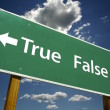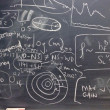Why Modern Physics Does Not Refute Thomistic Philosophy
by Dr. Dennis Bonnette
Filed under Philosophy, Science

Today some claim that modern physics evinces that Aristotelian-Thomist philosophy is an archaic myth that has outlived its credibility. They say things like, “If Thomist metaphysics contradicts modern physics, then Thomism is false.” They make claims against Thomism, citing modern physical theories like quantum mechanics and relativity. We are told counterintuitive things, such as that (1) whole universes can pop into existence from nothing according to quantum mechanics, (2) effects... Read More
Do Theological Claims Need to be Falsifiable?
by Dr. Edward Feser
Filed under Belief, Christianity and Science

Antony Flew’s famous 1950 article “Theology and Falsification” posed what came to be known as the “falsificationist challenge” to theology. A claim is falsifiable when it is empirically testable—that is to say, when it makes predictions about what will be observed under such-and-such circumstances such that, if the predictions don’t pan out, the claim is thereby shown to be false. The idea that a genuinely scientific claim must be falsifiable had already been given currency... Read More
Is a Proof Bad If It Fails to Convince Everyone?
by Dr. Michael Augros
Filed under The Existence of God

Some atheists will object to arguments for God by observing, "If a particular proof for God is so strong, why doesn't it convince everyone?" This objection is perhaps the most prevalent, and the cheapest one to make, yet a complete answer to it involves several components and is also interesting in its own right. This objector presents the theist with a dilemma: either I must pretend to be a supergenius like none the world has ever seen, presenting new and amazing arguments for God’s... Read More
Love, Tolerance, and the Making of Distinctions
by Bishop Robert Barron
Filed under Man

I recently wrote a piece on Bruce Jenner’s transformation into Caitlyn Jenner. I argued that the manner in which Jenner spoke of his transition reflected a Gnostic anthropology, which is repugnant to a Biblical view of the human being. I didn’t say a word about Jenner personally; I urged no violence against him/her; I didn’t question his/her motives. I simply made an observation that the moral and spiritual context for transgenderism is, from a classically Christian standpoint,... Read More
The Splendor of Thomistic Theism
by Karlo Broussard
Filed under The Existence of God

NOTE: This is the second of a two-part series. Read part 1 here. With the accidentality and priority of being for sensible things now in place, there is only one preliminary metaphysical principle that we need to establish before we can defend Premise 1 (from the first part in this series) and that is the fact that every particular thing—whether sensible or non-sensible (immaterial)—whose being is accidental and prior to its nature must receive being from an agent outside itself, i.e.,... Read More
Why Aquinas’ Argument for God Succeeds and Others Fall Short
by Karlo Broussard
Filed under The Existence of God

NOTE: This is the first of a two-part series. The second part will be shared on Wednesday. Does God exist? Readers here at Strange Notions are well aware that throughout the centuries there have been no few attempts in constructing arguments to support an affirmative answer to this question. This is no less true today (I previously took a shot at making my humble contribution to the discussion here at Strange Notions, which you can read in six parts). Christian philosophers have put forth... Read More
Marriage, Natural Law, and the Truth of Sexual Ethics
by Robert P. George
Filed under Sexuality

Gary Gutting is a Notre Dame philosophy professor who thinks that what counts about arguments is whether they “work.” And so his complaint against natural-law arguments for Catholic teachings about sex is that they “no longer work (if they ever did)”. His New York Times “Opinionator” post of March 12th (“Unraveling the Church Ban on Gay Sex”) names us as two people who are “still” exponents of such arguments. For us what counts about an argument is whether it is sound,... Read More
How Should We Speak of God? A Response to Daniel Linford
by Thomas M. Cothran
Filed under Atheism, The Existence of God

Last December, an article by Daniel Linford entitled "Do Atheists Reject the Wrong Kind of God? Not Likely" appeared at Scientia Salon. Certain recent "popular books,” according to Linford, have advanced a "mystical" notion of God, arguing that contemporary atheists have directed their disbelief only toward "smaller" conceptions of the divine. Three contemporaries are singled out: Karen Armstrong, John Haught, and David Bentley Hart. On what Linford denominates the "mystical" view, God... Read More
Causality and Radioactive Decay
by Dr. Edward Feser
Filed under Science

NOTE: Today we finish our two part series by Dr. Edward Feser exploring questions about science, philosophy, causality, and radioactive decay. You can read the first part here. Now, if there must be causality at the macro level (at the very least in the case of the causal relations between the external world and our perceptual experiences of it), and this causality is not captured in the description of the world that physics itself gives us, then it follows that there... Read More
Fads and Fallacies in the Name of Science
by Dr. Edward Feser
Filed under Science

NOTE: Today we begin a two part series by Dr. Edward Feser exploring questions about science, philosophy, causality, and radioactive decay. We'll share the second part on Wednesday. At the Catholic blog Vox Nova, mathematics professor David Cruz-Uribe writes: "I… am currently working through the metaphysics of St. Thomas Aquinas as part of his proofs of the existence of God… [S]ome possibly naive counter-examples from quantum mechanics come to mind. For instance,... Read More






